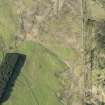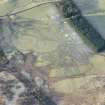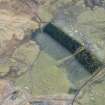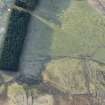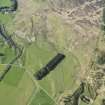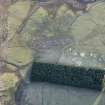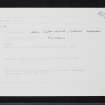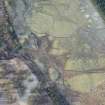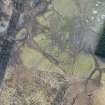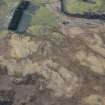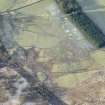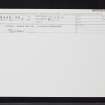Creag Dubh-leitir, Gleann Fearnach
Township (Medieval) - (Post Medieval)
Site Name Creag Dubh-leitir, Gleann Fearnach
Classification Township (Medieval) - (Post Medieval)
Alternative Name(s) Castle Pirnie Cottage
Canmore ID 27590
Site Number NO06SE 28
NGR NO 0555 6387
Datum OSGB36 - NGR
Permalink http://canmore.org.uk/site/27590
- Council Perth And Kinross
- Parish Moulin
- Former Region Tayside
- Former District Perth And Kinross
- Former County Perthshire
Field Visit (19 January 1989)
NO06SE 28 055 638
Situated on a broad terrace some 450m SE of Castle Pirnie cottage there are the remains of what is probably a small fermtoun comprising at least twelve buildings, three enclosures and a kiln. The buildings are described from N to S.
The remains of a round-ended two-compartment building (A; NO 0554 6388) lie on a low ridge at the N end of the fermtoun and measure 19.3m in length and narrow from up to 6.5m in width at the WNW end to 5.3m at the ESE end over turf-covered stone wall-footings 0.9m in thickness and up to 0.7m in height.
Adjacent to the WNW end of (A) there are the remains of a building (B) (at least 9.3m from WNW to ESE by 4.8m transversely overall), whose NW end now lies within a forestry plantation and a few metres further to the NE a subrectangular building (C) (10m from WNW to ESE by 4.7m transversely overall). There is an ancillary structure at the ESE end of the latter (7.1m from NW to SE by 4.5m transversely overall).
A fourth building (D; NO 0555 6387) is set in echelon to the S side of the first building (A) and measures 13.4m from WNW to ESE by 4.9m transversely over turf-covered wall-footings 0.7m in thickness and 0.4m in height. The NNE wall is bowed and there is no indication of an entrance; a drain cuts between (D) and (A) and emits into a hollow, possibly an earlier quarry scoop, to the E.
Immediately to the ESE of (D) and at right angles to it, there are the wasted remains of a subrectangular building (6.7m from NE to SW by 4.1m transversely overall), and beyond it a building (E; NO 0556 6385) measuring 11.4m from NNW to SSE by 4.5m over turf-covered stone wall-footings 1m in thickness and 0.6m in height. An entrance on the WSW side leads in to a yard which lies between the building and the easterly of three enclosures.
Almost touching the SSE end of (E) there are the remains of a building (F) (6.6m NW-SE by 4.1m overall) with an entrance midway along the SW wall; at right-angles to the SE end there is a rectangular hollowed depression, perhaps a midden. This depression joins the NE corner of the easterly of three conjoining enclosures which extend parallel to buildings (A to F).
Attached to the NE side of the easterly enclosure there are the remains of a rectangular structure, probably a pen (7.8m NW-SE by 3.3m overall), whilst at the W end of the NE side of the second enclosure, there are the remains of a building (9.2m NNW-SSE by 5.1m overall), and on the NE side of the westerly enclosure, which contains traces of ridge and furrow cultivation, two small pens.
Situated some 30m SSE of the E enclosure there is a well-preserved kiln with chambers at both ends (12.5m NE-SW by 6m overall). The bowl measures about 2.8m in diameter and there are traces of a scarcement surviving around the SE edge.
Situated a few metres SSE of the kiln there are the remains of a round-ended building (H) measuring 9.1m NNW-SSE by 5m over turf-covered stone wall-footings 0.8m in thickness.
Visited by RCAHMS (JRS), 19 January 1989
RCAHMS 1990.


















